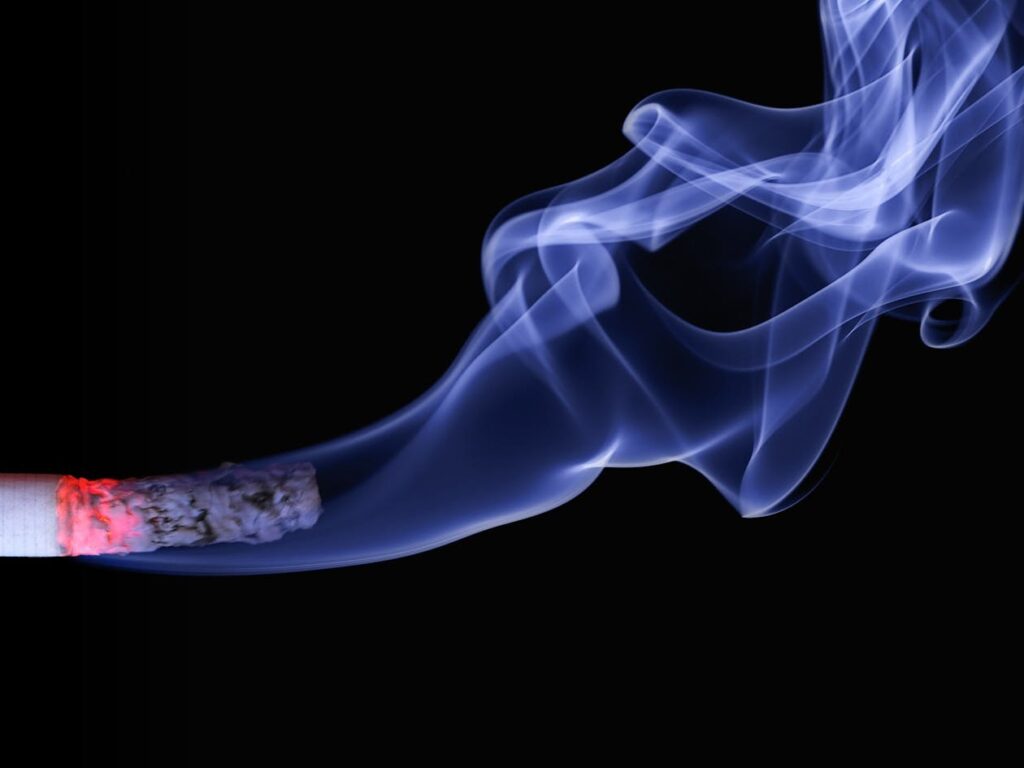Two Cigarettes a Day Just Bought You a 60 Percent Higher Chance of Dying

You tell yourself it’s nothing. A couple of cigarettes after dinner. Maybe one with your morning coffee. Perhaps another when stress claws at your chest during lunch break. You’re not a real smoker, right? Real smokers go through packs. Real smokers hack and wheeze. Real smokers have those problems.
You’re just managing stress. You’re just taking the edge off. You’re in control.
Between sips of coffee and exhaled smoke, you’ve constructed an elaborate defense. You know people who smoke far more than you do. You know people with actual problems. You’re different. You’re careful. You’re aware of the risks, which somehow makes you immune to them. Your body will give you a pass because you’re moderate, because you’re mindful, because you only indulge a little.
Scientists have news that will shatter your comfortable illusion.
What 300,000 Lives Taught Us About Small Habits
Researchers at Johns Hopkins University spent nearly two decades watching what happens when people convince themselves that “just a little” won’t hurt. They tracked over 300,000 adults, documenting their smoking patterns, following their lives, and counting their deaths.
What they found should terrify anyone who thinks light smoking is a safe compromise.
Men and women smoking as few as two cigarettes daily carried a 60 percent higher risk of death from any cause compared to people who never touched tobacco. Read that again. Two cigarettes. Not two packs. Not even half a pack. Two individual cigarettes each day dramatically increased their chances of dying.
Heart disease risk jumped 50 percent higher in the same group. Published in PLOS Medicine in November 2024, the research obliterated the comforting lie that minimal smoking equals minimal danger.
You might think you can bargain with biology. You might believe your body will grant you mercy for moderation. Biology doesn’t negotiate. Your cardiovascular system doesn’t care about your excuses or your intentions.
Death Doesn’t Count Cigarettes Before It Knocks

Numbers don’t lie, even when we desperately want them to. Even when we craft elaborate stories about why we’re different, why the rules don’t apply to us, why our two cigarettes somehow count less than someone else’s two cigarettes.
Researchers discovered that smoking as few as 100 cigarettes over an entire lifetime might be enough to raise death risk. One hundred cigarettes sounds like a lot until you do the math. For someone smoking two daily, that’s 50 days. Less than two months. A summer vacation. A holiday season.
Men faced the same elevated mortality risks as women. Age didn’t protect anyone. Education didn’t shield anyone. Income didn’t insulate anyone. Tobacco killed without discrimination, without sympathy, without second chances.
Current smokers died at higher rates than former smokers, but here’s where hope takes a dark turn. Former smokers still carried elevated heart disease risk more than 20 years after they quit. Two decades of clean living, and the ghost of smoking still haunted their cardiovascular systems.
Between 1965 and 2022, adult smoking in America plummeted from 42 percent to roughly 12 percent. We should celebrate, right? We won the war on tobacco. Except we didn’t. During that same period, people smoking fewer than 15 cigarettes per day increased by 85 percent.
Americans didn’t quit smoking. We just got better at lying to ourselves about it.
Blood Vessels Remember Every Puff You Take

Dr. Jennifer Miao, a cardiologist at Yale University, explains what happens inside your body when smoke enters your lungs. Tobacco damages the blood vessel lining and accelerates the development of plaques and coronary artery disease.
Picture your blood vessels as smooth highways where blood flows freely, delivering oxygen and nutrients to every cell in your body. Smoking turns those highways into construction zones. Each cigarette dumps chemicals into your bloodstream that scratch and scar the delicate vessel walls.
Your body tries to repair the damage. It sends cholesterol to patch the wounds. But cholesterol doesn’t know when to stop. It builds up, layer after layer, creating plaques that narrow your arteries. Blood flow slows. Your heart works harder. Oxygen struggles to reach vital organs.
Smoking also triggers heart rhythm problems. Atrial fibrillation, where your heart beats irregular and often fast, becomes more common. Strokes happen when blood clots form in damaged vessels and travel to your brain. None of this requires heavy smoking. Two cigarettes daily is enough to start the cascade.
Your body doesn’t grade on a curve. Your cardiovascular system doesn’t offer partial credit for smoking less than your neighbor. Damage is damage, whether you inflict it gradually or all at once.
One Cigarette Has No Safe Space in Your Body

Dr. Erfan Tasdighi, an internal medicine physician at Rutgers New Jersey Medical School and study co-author, delivered a message that destroys any remaining illusions. Even less than one cigarette a day can increase different multiple cardiovascular outcomes, and it’s not something that’s clinically insignificant.
Less than one cigarette daily. Not two. Not even one full cigarette. A few puffs here and there still increase your risk of heart attack, stroke, heart failure, and death.
We spent decades believing that dose made the poison. We thought if we kept the dose low enough, we’d stay safe. We were wrong. When it comes to smoking, no threshold exists below which you’re protected. No magic number of cigarettes grants you immunity from consequences.
People who never smoked served as the baseline in the research. Anyone who smoked even minimally showed worse outcomes. Former light smokers still carried risk. Current light smokers faced substantial danger. Heavy smokers accelerated toward early graves.
Where you fall on that spectrum matters less than you think. You’re not safe at any point. You’re just less doomed than someone smoking more, which is cold comfort when cardiovascular disease comes calling.
Quitting Cuts Risk Faster Than You Think

Here’s where darkness gives way to light. Here’s where despair transforms into possibility. Here’s where you get to choose a different ending.
When you quit smoking, your risk drops fast. Not eventually. Not someday. Right now. When they stop smoking, their risk goes down immediately and significantly.
Your body begins healing the moment you stop poisoning it. Within hours, carbon monoxide levels in your blood drop. Within weeks, lung function improves. Within months, circulation gets better. Within years, heart disease risk falls dramatically.
Research showed that the most substantial risk reduction happens during the first ten years after cessation. Your body works hard to undo damage, clearing out toxins, repairing vessels, rebuilding tissue. After two decades, former smokers demonstrated over 80 percent lower relative risk compared to current smokers.
Complete recovery takes time. Even after 20 or 30 years, former smokers might still show slightly elevated risks compared to people who never smoked. But “slightly elevated” beats “60 percent increased” every single time.
You can’t erase your smoking history. You can’t pretend those cigarettes never happened. But you can stop writing new chapters in a story that ends badly. You can change the trajectory. You can give your body the chance it deserves to heal.
Doctors Need to Ask Better Questions Now

Medicine has measured smoking wrong for decades. Doctors ask how many packs per year you smoke, calculate your pack-year history, and use that number to assess risk. Turns out pack-years don’t tell the whole story.
Former smokers with more than 20 pack-years showed lower health risks than current smokers with fewer than five pack-years. Smoking status mattered more than cumulative exposure. Whether you currently smoke determines your risk more than how much you smoked over your lifetime.
Dr. Miao noted that clinicians need better approaches for identifying and quantifying cigarette use. Asking “Do you smoke?” isn’t enough. Asking “How many packs per year?” misses crucial information. Doctors need to know about intensity, frequency, patterns, and recent changes.
Someone smoking two cigarettes daily flies under the radar in traditional assessments. They don’t seem like a serious smoker. They don’t trigger alarm bells. They get missed, and they die anyway.
Medical practice must evolve to match scientific understanding. We need conversations that capture the full picture of tobacco use. We need screening that identifies all levels of smoking, not just heavy users. We need interventions that meet people where they are instead of where we wish they were.
Your Next Move Matters More Than Your Last Mistake
You can’t change what you’ve already done. You can’t unsmoke cigarettes that already burned. You can’t undo damage already inflicted. But you control what happens next.
Every cigarette you don’t smoke is a victory. Every day you stay quit is progress. Every week without tobacco brings you closer to the life you deserve.
Quitting is hard. Anyone who tells you otherwise is lying or has never tried. Nicotine addiction rewires your brain, making cigarettes feel like oxygen. Withdrawal feels like drowning. Cravings ambush you when you least expect them. But hard doesn’t mean impossible. Millions of people have quit. Millions more will quit. You can be next.
Resources exist to help you. Call 1-800-QUIT-NOW to connect with free counseling and support. Talk to your doctor about medications that reduce cravings and ease withdrawal. Join support groups where people understand your struggle because they’ve lived it.
You might fail the first time. You might fail the tenth time. Each attempt teaches you something. Each attempt brings you closer to success. Each attempt proves you haven’t given up on yourself.
Your body wants to heal. Your cardiovascular system wants to recover. Your blood vessels want to clear. You just have to give them the chance.
Two cigarettes a day might seem like nothing. Two cigarettes a day might feel manageable. Two cigarettes a day might appear harmless compared to a pack-a-day habit. Two cigarettes a day will still kill you.
Stop bargaining with death. Stop negotiating with disease. Stop pretending that “just a little” won’t hurt you. Science has spoken. The evidence is clear. No amount of smoking is safe.
You deserve a future where your heart beats strong and steady. You deserve decades of life that smoking will steal. You deserve to breathe without wheezing, to climb stairs without gasping, to play with grandchildren without collapsing.
Quit today. Quit now. Quit before your body runs out of second chances. Your next cigarette won’t make anything better. Your next cigarette will only dig your grave a little deeper. Choose life instead.
Loading...

